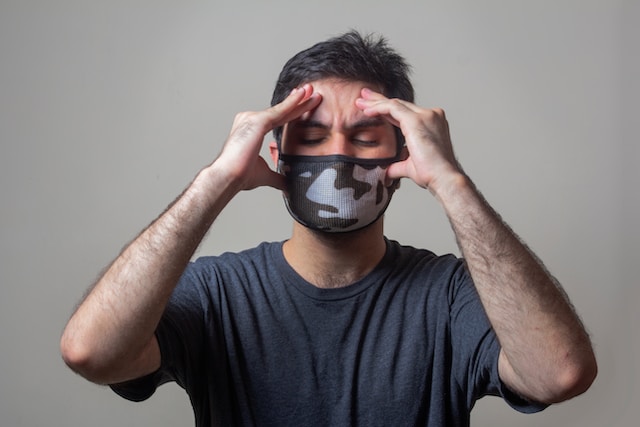Headache is a common condition that most people experience at some point in their lives. It is a painful sensation in the head that can range from mild to severe and can be accompanied by other symptoms such as nausea, dizziness, or sensitivity to light and sound.
Headaches can be caused by a variety of factors, including tension, dehydration, sinus problems, or more serious underlying conditions. While most headaches are not a cause for concern, they can be disruptive and affect a person’s quality of life.
Therefore, it is important to understand the different types of headaches and their causes, as well as ways to prevent and manage them.
What Is A Headache?
A headache is a pain or discomfort that occurs in the head or upper neck. It is one of the most common medical complaints and can range in severity from a mild, dull ache to a sharp, intense pain that interferes with daily activities.
Headaches are typically classified into primary or secondary headaches, depending on whether they are the main condition or a symptom of another underlying medical problem.
While most headaches are not serious and can be relieved with simple measures such as rest, over-the-counter pain relievers, or lifestyle changes, it is important to seek medical attention if the headache is severe, persistent, or accompanied by other symptoms.
Types Of Headaches:
There are several types of headaches, and the classification of headaches is based on their underlying cause, symptoms, and duration. Below we discussed the most common types of headaches.
Tension headache:
Tension headache is a common type of headache characterized by mild to moderate pain or discomfort in the head, scalp, or neck area. It is often described as a dull, achy sensation that feels like pressure or tightness around the head, and it can affect both sides of the head.
Tension headaches are typically caused by muscle tension or tightness in the head and neck area, which can be triggered by a variety of factors such as stress, anxiety, poor posture, eye strain, dehydration, or lack of sleep. They can also be caused by certain medications or underlying medical conditions, although these cases are less common.
Migraine headache:
Migraine headache is a type of headache that is characterized by intense, throbbing pain, often on one side of the head and is often accompanied by other symptoms such as nausea, vomiting, and sensitivity to light and sound. The pain of a migraine headache can last for hours to days and can be severe enough to interfere with daily activities.
Cluster headache:
Cluster headaches are a type of headache that usually occurs in cycles, with multiple headaches occurring over weeks or months. They are characterized by severe pain on one side of the head and can be accompanied by symptoms such as eye-watering, drooping eyelids, and nasal congestion.
Sinus headache:
Sinus headaches are caused by inflammation or infection of the sinuses, which are air-filled cavities located around the nose and eyes. They are characterized by pain and pressure in the forehead, cheeks, and eyes.
Rebound headache:
Rebound headaches are caused by overuse of pain medications, and can occur when a person takes pain relievers frequently for an extended period. They are typically characterized by a dull, constant pain that is present most of the time.
Other less common types of headaches include hormonal headaches, thunderclap headaches, and post-traumatic headaches. It is important to seek medical attention if you experience severe or persistent headaches, or if your headaches are accompanied by other symptoms.
Symptoms of Headache:
The symptoms of a headache can vary depending on the type and underlying cause of the headache. Here are some common symptoms of a headache:
- Pain or discomfort in the head or upper neck
- A dull ache or throbbing sensation in the head
- Sensitivity to light and sound
- Nausea and vomiting
- Dizziness or lightheadedness
- Fatigue or weakness
- Difficulty concentrating
- Muscle tension in the neck and shoulders
- Changes in vision or visual disturbances, such as seeing spots or flashes of light
- Nasal congestion or a runny nose (in the case of a sinus headache)
- Pain or pressure behind the eyes or in the forehead (in the case of a sinus headache)
Causes Of A Headache:
There are many possible causes of a headache, including:
- Tension: Tension headaches are the most common type of headache and are usually caused by muscle tension in the head, neck, and shoulders.
- Dehydration: Not drinking enough fluids can lead to dehydration, which can cause headaches.
- Eyestrain: Spending too much time looking at screens or performing tasks that require visual focus can cause eye strain, which can lead to headaches.
- Sinus problems: Inflammation or infection of the sinuses can cause pain and pressure in the head.
- Hormonal changes: Changes in hormone levels can cause headaches, particularly in women during menstruation or menopause.
- Illness: Headaches can be a symptom of many illnesses, including colds, flu, and other infections.
- Medications: Certain medications can cause headaches as a side effect.
- Environmental factors: Exposure to certain smells, lights, or loud noises can trigger headaches in some people.
- Trauma: Head injuries or trauma can cause headaches.
- Underlying medical conditions: Headaches can be a symptom of more serious medical conditions such as brain tumors, aneurysms, or meningitis.
These are just a few examples of the many possible causes of headaches. If you are experiencing frequent or severe headaches, it is important to consult with a healthcare professional to determine the underlying cause and develop an appropriate treatment plan.
Headache Treatment:
The treatment for a headache will depend on the type and underlying cause of the headache. Here are some common treatments for headaches:
- Over-the-counter pain relievers: Mild to moderate headaches can often be treated with over-the-counter pain relievers such as acetaminophen, ibuprofen, or aspirin.
- Prescription medications: For more severe or persistent headaches, prescription medications such as triptans, ergotamines, or opioids may be prescribed by a healthcare professional.
- Lifestyle changes: Making lifestyle changes such as reducing stress, improving sleep habits, staying hydrated, and avoiding triggers such as certain foods or environmental factors can help prevent headaches.
- Relaxation techniques: Relaxation techniques such as deep breathing, meditation, or yoga can help reduce tension and stress that can contribute to headaches.
- Physical therapy: Physical therapy or massage therapy can help alleviate muscle tension that may be contributing to headaches.
- Alternative therapies: Some people find relief from headaches with alternative therapies such as acupuncture or herbal supplements.
Difference Between A Headache And A Migraine:
The main difference between a headache and a migraine is the type and severity of the pain and other symptoms. While all migraines are a type of headache, not all headaches are migraines. Here are some of the differences between the two:
- Pain intensity: Migraines are usually more severe than regular headaches, and the pain is often described as pulsing or throbbing. In contrast, regular headaches tend to be mild to moderate in intensity.
- Location: Migraines are often located on one side of the head, while regular headaches can occur on both sides.
- Duration: Migraines can last anywhere from several hours to several days, while regular headaches typically last for a few hours.
- Associated symptoms: Migraines are often accompanied by other symptoms, such as nausea, vomiting, sensitivity to light and sound, and visual disturbances. These symptoms are not usually present in regular headaches.
- Triggers: Migraines can be triggered by certain foods, stress, hormonal changes, and other factors, while regular headaches may be caused by tension, sinus problems, or dehydration.
FAQs:
Q. What is the most common type of headache?
– The most common type of headache is a tension headache, which is usually caused by muscle tension in the head, neck, and shoulders.
Q. How long do headaches typically last?
– Headaches can last anywhere from a few minutes to several days, depending on the type and underlying cause of the headache.
Q. When should I see a healthcare professional about my headaches?
– You should consult with a healthcare professional if you experience severe or persistent headaches, or if your headaches are accompanied by other symptoms such as fever, confusion, or loss of consciousness.
Q. Can headaches be prevented?
– In some cases, headaches can be prevented by making lifestyle changes such as reducing stress, improving sleep habits, staying hydrated, and avoiding triggers such as certain foods or environmental factors.
Q. Are headaches a sign of a more serious medical condition?
– While most headaches are not a sign of a serious medical condition, headaches can be a symptom of more serious conditions such as brain tumors, aneurysms, or meningitis. If you are experiencing frequent or severe headaches, it is important to consult with a healthcare professional to determine the underlying cause and develop an appropriate treatment plan.
Q. What can I do to relieve a headache?
– Over-the-counter pain relievers, prescription medications, lifestyle changes, relaxation techniques, and alternative therapies such as acupuncture may be effective in relieving headaches. However, it is important to consult with a healthcare professional to determine the most appropriate treatment for your specific type of headache.










